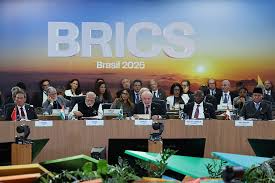BRICS nations ‘condemn and reject’ Europe’s carbon-based import duties

BRICS Rejects EU’s Carbon Tax Plan, Citing Trade Discrimination
The BRICS bloc—Brazil, Russia, India, China, and South Africa—has strongly opposed the European Union’s Carbon Border Adjustment Mechanism (CBAM). During their summit in Kazan, the group called the EU’s carbon-based import duties “unilateral and discriminatory.”
This firm statement reflects growing frustration among developing economies. They believe Europe’s new climate policy could harm their industries and restrict fair trade.
What Is CBAM?
The European Union created the Carbon Border Adjustment Mechanism to address carbon leakage. This occurs when companies shift operations to countries with weaker climate rules. CBAM aims to prevent this by charging carbon-related fees on imports such as steel, cement, aluminium, and fertilisers.
The EU plans to fully implement CBAM by 2026. Exporters to Europe must buy carbon certificates that reflect EU pricing rules. While the EU says this promotes climate accountability, many countries disagree.
Why BRICS Opposes It
The BRICS countries argue that CBAM is an unfair burden on developing nations. They say the policy violates trade equality and targets their key industries.
India has taken a clear stance. Commerce Minister Piyush Goyal said the policy hurts developing economies, which lack the same resources to reduce emissions. He pointed out that industrialized nations developed without such restrictions.
China’s environment ministry described CBAM as a hidden trade barrier. South Africa and Brazil raised similar concerns. They worry the policy could shrink their export markets and cut thousands of jobs.
Impact on BRICS Economies
CBAM could damage several BRICS industries:
- India may see rising costs in aluminium and steel.
- Brazil’s fertiliser and iron exports could lose value.
- Russia faces possible losses in aluminium and energy.
- South Africa risks job cuts in mining and metals.
A study by the Council on Energy, Environment and Water (CEEW) estimates India could lose over $8 billion in exports each year. These losses could ripple through economies that rely heavily on global trade.
Is It About Climate or Control?
Supporters argue that CBAM encourages greener production and levels the global playing field. But critics believe it shifts the climate burden to poorer nations. BRICS nations point out that developed countries caused most historical emissions.
Many developing countries still struggle to provide basic services. They argue that policies like CBAM put them at a disadvantage. Without financial or technological help, switching to cleaner production becomes harder.
BRICS members want climate rules to follow international agreements. They prefer the United Nations Framework Convention on Climate Change (UNFCCC) and the Paris Agreement over unilateral actions.
BRICS Pushes Its Own Plan
The bloc is not just criticizing Europe—they’re also creating alternatives. BRICS members signed a pact to launch a Carbon Markets Partnership. This move helps them set their own carbon pricing rules.
They also support using local currencies in trade. By moving away from the U.S. dollar, BRICS hopes to reduce exposure to Western economic policies.
India and China are backing this shift. Both nations want South-South cooperation, including joint investments in green technologies. This approach allows them to support poorer nations with financing and innovation.
What Lies Ahead?
The EU insists CBAM follows World Trade Organization rules. But many countries are preparing legal responses. The WTO may become the forum for resolving this growing conflict.
The global climate fight requires cooperation, not confrontation. If major players don’t align on fair methods, disputes like this may increase.
The big question remains: Can climate action be fair to all? BRICS nations believe it must consider development needs, not just carbon scores.
Conclusion
The BRICS bloc has made its position clear. It rejects the EU’s carbon tax policy as unfair and harmful to trade. Instead, the group calls for joint solutions, built on trust, equality, and global cooperation.
As the climate crisis deepens, how the world balances growth and emissions will shape international trade—and global politics—for years to come.






